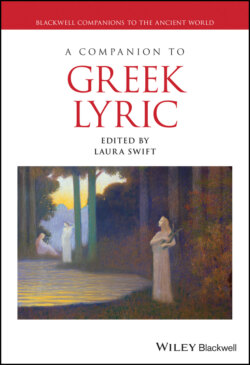Читать книгу A Companion to Greek Lyric - Группа авторов - Страница 42
CHAPTER 4 Commemorating the Athlete
ОглавлениеNigel Nicholson
In Pindar’s odes athletic victory is represented as one of the greatest human achievements. “For the remainder of his life, whoever wins a victory voyages in honey-sweet calm, at least as far as contests can confer it,” Pindar declares in Olympian 1.97– 99.1 Of an aging Olympic victor whose son has won a youth contest at Delphi, he goes even further: “Blessed and hymned by the wise is that man who conquering through his hands or the excellence of his feet, takes the greatest of prizes by daring and strength, and while still living sees his young son in turn meet Pythian crowns. He can never scale brazen heaven, but of all the glories that we mortal race touch, he voyages to the furthest limit” (Pyth. 10.22–29). Some men are in awe of the victor (Ol. 9.96, Pyth. 10.58, Nem. 11.12), others are envious (Ol. 6.74–76, Nem. 4.39–41), while women desire him, or wish he was their son (Pyth. 9.97–103). Athletic victory may not cure all ills, but in a confusing world of countless independent city states with a wide variety of constitutions and ideologies, it seems to provide an anchor, a universal value that bound the Greeks together and expressed some deeper commonality beneath all the differences.
This universality is a mirage. Some were much less impressed by athletic victory, and questioned whose interests it served. Xenophanes, one of the late archaic period’s great intellectual iconoclasts, complained that even those who won the most prestigious events at the most prestigious games did not make a city “better governed” or “fatten the city’s storehouses” (fr. 2.19–22 W). Xenophanes spent much of his life in two cities—Colophon and Elea—that made no significant mark in competitive athletics, but an earlier critic from Sparta, an athletic powerhouse, also found athletic achievement wanting—because it did not imply excellence in battle: “I would not make mention of nor rate a man whose excellence lay in his feet or his wrestling… For a man is not good in war unless war unless he can endure the sight of bloody slaughter and, standing close by, reach out against the enemy” (fr. 12.1–13). Tyrtaeus does not say that athletes bring no benefit to the community, but his declaration that the staunch hoplite is “a common good shared by the city and the whole people” (fr. 12.15) suggests that he considered the returns that athletes conferred on the larger community to be limited. Skepticism of the worth of athletics can also be traced in this larger community. One of the potsherds that remain from Athens’ practice of ostracism calls not only for Megacles, the politician whose chariot victory was celebrated by Pindar’s Pythian 7, to be ostracized, but “also his horses.”2 The writer clearly knew of Megacles’ success in the games, but saw in this no reason to keep him around.
If, then, athletic victory seems like a cultural anchor in Pindar’s odes, that is the odes’ achievement, rather than describing universal values, the odes promoted the values of their patrons by making them seem universal. The value of athletic victory was contested, and each ode had two jobs: to praise the specific victory and to establish the value of the whole institution of athletics.3
